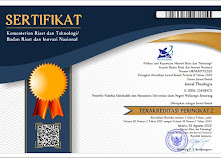TAFSIR AYAT-AYAT KASIH SAYANG DALAM MASYARAKAT PLURAL
DOI:
https://doi.org/10.21580/teo.2012.23.1.1760Keywords:
solidaritas sosial, inklusif, ekslusif, pluralAbstract
Islam sangat menghargai harkat kemanusiaan universal, menganjurkan hidup dengan damai dan saling menyayangi. Melakukan kekerasan dan pembunuhan terhadap seorang manusia tanpa ada alasan yang benar, sama halnya dengan telah membunuh manusia sejagat. Namun, di tengah riuhnya tuntutan tersebut, muncul paradoks: yaitu intensitas ritual keagamaan menjadi sangat romantik dan marak, namun dalam kehidupan sehari-hari belum mampu melahirkan kesalehan diri, apalagi kesalehan sosial. Kehidupan beragama tampak meriah dalam rutinitasnya, namun tanpa disertai dengan keprihatinan dan tanggung jawab sosial. Tulisan berikut adalah upaya sederhana menggali dan menafsirkan ayat-ayat al-qur’an yang terkait dengan cara hidup yang damai dan kasih sayang dalam masyarakat yang pluralDownloads
References
Abdurrahman, Muslim, Islam Transformatif (Jakarta: Pustaka Firdaus, 1995).
Ali, Mukti, Ilmu Perbandingan Agama (Bandung: Mizan, 1998).
Engineer, Asghar Ali, Islam dan Teologi Pembebasan, terj. Agung Prihantoro (Yogyakarta: Pustaka Pelajar, 1999).
Lyden, John, (ed), Enduring Issues In Religion, (San Diego: Greenhaven Press Inc, 1995)
Mathews, World Religion (Canada: International Thompson Publishing, 1999).
Munawar-Rahman, Budhy, Islam Pluralis, (Jakarta, Paramadina, 2000).
Pannikar, Ramundo, Dialog Intra Religius (Yogyakarta: Kanisius, 1994).
Rahman, Fazlur, Tema Pokok al-Qur’an, terjemah Anas Mahyudin (Bandung: Penerbit Pustaka, 1983).
Schuon, F., The transcendent Unity of Religions. Wheston (Illinois: The Theosophical Publishing House, 1984).
Shihab, Alwi, Islam Inklusif, (Bandung: Mizan, 1999).
Downloads
Published
How to Cite
Issue
Section
License
The copyright of the received article shall be assigned to the journal as the publisher. The intended copyright includes the right to publish the article in various forms (including reprints). The journal maintains the publishing rights to the published articles.
Note: Authors are allowed to use their articles for any legal purposes deemed necessary without written permission.
Licensing

This work is licensed under a Creative Commons Attribution-ShareAlike 4.0 International License.
_______
Copyright Transfer Aggreement
In order for Jurnal Theologia to publish and distribute research articles, the editors need publishing rights (transferred from author to publisher). This agreement relates to the transfer/publishing copyright license to Jurnal Theologia but the authors still have significant rights to use and share their published articles.
Jurnal Theologia supports the need for writers to share, disseminate and maximize the impact of their research and their rights on any database. As a journal article writer, you have the right to various uses of your articles, including that by the institution or company where you work. Copyright can be used without the need for special permission. Authors who publish articles in the Jurnal Theologia have broad rights to use their work for teaching and scientific purposes without requesting permission, including:
- Use by the author for lectures, presentations, or conferences, with distribution of copies to participants;
- Distribution to colleagues for research use;
- Use in compilations of the author's subsequent work;
- inclusion in a thesis or dissertation;
- Reuse of sections or excerpts from articles in other works (with full acknowledgment of the final article);
- Preparation of derivative works (other than commercial purposes) (with full acknowledgment of the final article);
- Voluntary posting on open websites operated by authors’ or writers' agencies for scientific purposes
When submitting a manuscript, authors do so on the understanding that if accepted for publication, the copyright for publishing (publishing right) of the article shall be assigned/transferred to Jurnal Theologia.
Authors whose articles are accepted for publication will receive confirmation via email and sent a Copyright Transfer Agreement.














